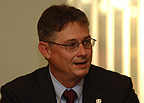March 29, 2006
New 'grid' may improve mental health treatment
CARBONDALE, Ill. -- A Southern Illinois University Carbondale alumnus in psychology is spearheading a groundbreaking treatment resource for seriously mentally ill people aimed at helping clinicians treat such conditions more effectively.
As chairman of a task force commissioned by the American Psychological Association, Richard H. Hunter guided the efforts behind the new "grid," which organizes dozens of assessment and treatment options for the seriously mentally ill. The goal of the document is to improve outcomes of treatment for such patients, who often present the greatest challenge to the mental health community.
Hunter said that over the past 15 years, funding challenges have squeezed patient care in the public mental health field, which includes state institutions, nursing homes and jails among others. As a result, practitioners in some cases developed over-reliance on drugs while shutting out more in-depth approaches and new therapies.
"Patients get worse and this leads to the revolving door syndrome or people going untreated or mistreated," Hunter explained. "The grid is focused on bridging the science-to-service gap. Studies show it can take 15 to 17 years for innovative methods to make it into practice. That's too long."
During his four years leading the task force, Hunter shepherded more than 100 top experts in formulating the "best practices" for treatment of seriously mentally ill patients. The Veterans
Administration, which is the largest mental health institution in the country, and several other of the most influential psychology groups in the country are adopting and endorsing the document, now in its third revision.
"This is not just one person's ideas. It has the blessing of an expert panel that is highly respected in the field of mental health," Hunter said. "With so many contributing to it, it became a very rich document."
Jane Swanson, chairman of the Department of Psychology at SIUC, said the grid will be an invaluable tool for practitioners and students.
"The effort is to not just institutionalize those with serious mental illness, but to try functional interventions that will help them actually recover," Swanson said.
Hunter's work on the grid document, which includes several of the treatments and assessments he developed over his long career, is only the latest in a series of achievements in his field.
A Southern Illinois native who earned his undergraduate, master's and doctoral degrees at SIUC, Hunter has been a psychologist for more than 40 years. He runs a national mental health policy and training consultancy company from his home in Marion and serves as an adviser to lawmakers and as an expert witness in federal lawsuits dealing with so-called "right to treatment" issues. He served as superintendent of the Clyde L. Choate Mental Health and Developmental Center in Anna from 1987 to 1990, later serving in several top state mental health positions.
His work mainly involves the areas of training for mental health practitioners, improving case formulations for patients, legal issues and policy advisement.
Hunter sees a need to find treatment approaches that de-emphasize drugs in favor of finding and eliminating causation factors.
"For some, medication is all that is needed. It works fine. But the medicine-centric approach has not always been helpful, too often because of the way it is used," Hunter said. "We are attempting to re-introduce comprehensive care that doesn't just suppress symptoms."
As one approach, Hunter developed the "multimodal functional model," which trains clinicians to look for factors that may trigger psychotic behavior and to find ways to eliminate or diminish those factors.
Hunter argues that such an approach, though it takes longer and is more in-depth, is actually more economical because it is more effective at controlling serious mental illness in patients.
"Every facility has a ‘worst patient,'" Hunter said. "That patient takes up lots of resources. If you can improve that patient and others, it frees up those resources."
Hunter, who also holds a clinical appointment in the SIU School of Medicine, said the University plans to integrate the grid into its post-graduate and doctoral studies.
Leading in research, scholarly and creative activities is among the goals of Southern at 150: Building Excellence Through Commitment, the blueprint the University is following as it approaches its 150th anniversary in 2019.

Richard Hunter
Download Photo Here
